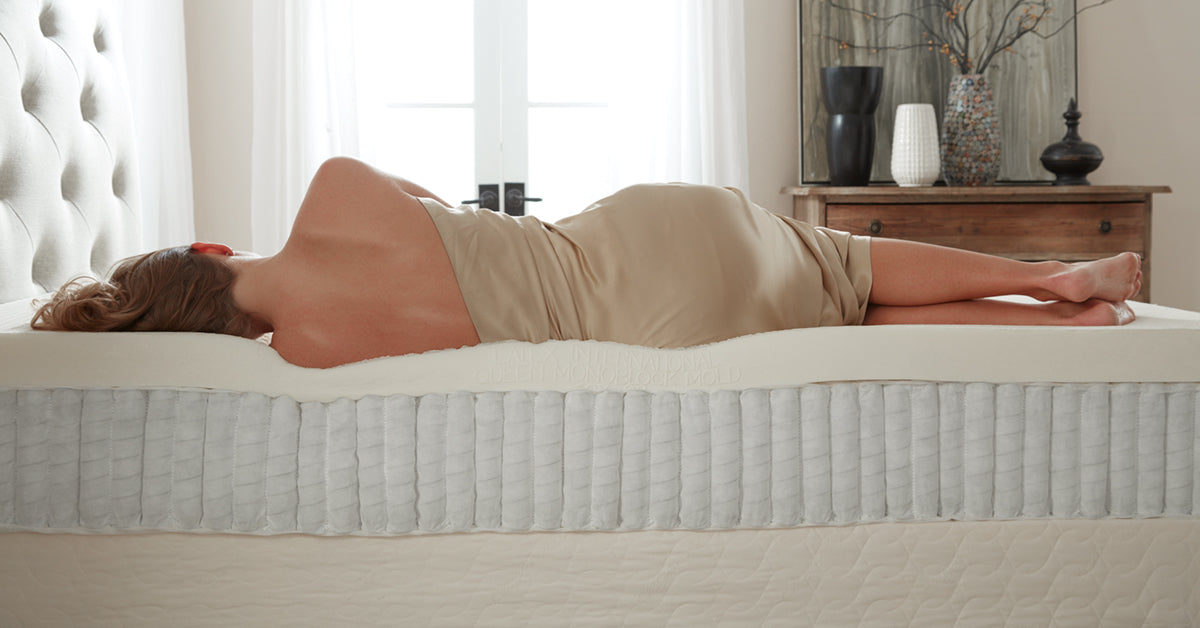What is the Best Mattress for Back Support?

Around 31 million adult individuals in the U.S. experience chronic or frequent back pain, according to the American Chiropractic Association. Back pain also accounts for over 260 million workdays missed every year. While there is a wide range of treatment options for back pain, many people can ease their daily symptoms simply by purchasing a more supportive and comfortable mattress to sleep on.
Factors to Consider in a Mattress for Back Support and Pain
The best mattress for sleepers with back pain depends on various factors, which includes their normal sleeping position and their body type. Ideally, your mattress should:
- Improve spinal alignment
- Conform to your body
- Keep you sleeping without sagging too much
Because of the design and material differences, however, certain types of mattresses tend to offer better pressure relief and back pain relief than others.
Choosing the right mattress type can be tricky. There are so many different mattress products on the market, and even if a mattress feels amazing to lay down on, this doesn't mean it's going to continue feeling amazing while you sleep on it for years to come.
Tips for Choosing the Best Mattress for Back Support
Here are some tips that can help you choose the best mattress to support your back:
- Ensure It Provides Proper Spinal Alignment
You might not realize it, but it's essential to have good posture when you're sleeping. The ligaments and muscles in your back have to recover and relax while you're sleeping. If your mattress is too squishy, or too firm, it can't properly support your spine at your lower back or neck the way it should.
Not all people will benefit from the same level of firmness. For example, if you have wide hips, it might be ideal for you to choose a slightly softer surface. To keep your spine in alignment, you'll require some more give. If your hips are narrower, you may be better off sleeping on a firmer surface.
- Test Out Your Mattress in a Sleep Trial
Select a mattress that comes with a sleep trial. Many mattress companies will allow you to test drive your new mattress for between 30 and 120 nights, and if you're not happy, you can return the mattress for a full refund. This time allows you to test drive your mattress before you make any commitments.
- Opt for "Medium-Firm" When In Doubt
While there's limited research, during one study, new mattresses were assigned by researchers to over 300 individuals experiencing low back pain. For 90 days, they used either "firm" or "medium-firm" mattresses. The individuals using the "medium" firmness level mattresses claimed to experience the least amount of discomfort.
You may wish to purchase a memory foam mattress (rather than a standard innerspring mattress). The foam will mold to your body, but keep in mind, memory foam also keeps in heat. Plus, it could also have more chemicals.
- Consider Your Spine Health
Along with your personal preference, another primary factor to consider when you're deciding on a mattress is one that's suitable for your spine health. Your spine has three slight curves naturally, and they must be supported, even if you're lying horizontal.
An ideal mattress will keep our body in neutral position, meaning your spine holds its natural slight curve, and everything stays aligned, including your:
- Buttocks
- Head
- Heels
- Shoulders
On a perfect mattress, you shouldn't experience any pressure. It might even feel like you're floating. The right mattress, over time, can:
- Encourage better sleep
- Relax your muscles
- Improve your posture
Buying the wrong mattress, however, can leave you waking up experiencing back pain, especially around the base of the spine, and this could disrupt healthy sleep.
- Take Into Account Your Weight
Your weight is another factor you should consider. If you're on the heavier side, you might find firm mattresses can be deceptively soft. If you're on the lighter side, a softer mattress might not provide you with a lot of "give." Typically, an average to heavy build is suited better for a medium to medium firm mattress.
Another essential component you shouldn't overlook is personal preference. Even if a mattress is more specialized for the needs of your spine, if you feel the mattress is uncomfortable, you're likely not going to get a great night's sleep on it. And, that's what mattresses are supposed to provide, after all.
It's essential you keep in mind the selection isn't exactly black and white. There's a spectrum of firmness when it comes to mattresses. Even more, you can compromise by owning a firm mattress in regards to spring suspension, but add a soft, plush topper.
Try an Eco Terra Hybrid Latex Mattress for Back Support
If you sleep on your back, you can benefit from a contouring mattress that decreases pressure on your lumbar region, and will support spinal alignment. A highly rated mattress for individuals who sleep on their back, or who experience back pain is the Eco Terra Hybrid Latex Mattress.
The latex in the Eco Terra hybrid mattress moderately contours to your body's shape, and the coils will support your spine. It offers “just the right weightlessness” for optimal sleep, in conjunction with isolated coils to provide ideal spine support. The Eco Terra mattress is available in medium and medium-firm.
Eco Terra mattresses are eco-friendly with non-toxic, natural materials. It's free of polyurethane and synthetics. It's handcrafted in California in the USA. You can enjoy a 90-night trial to test it out risk-free. Plus, you'll receive free shipping.







